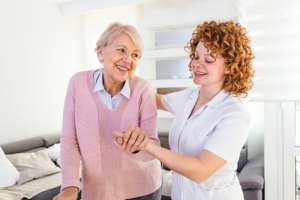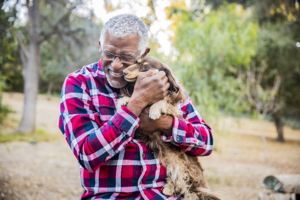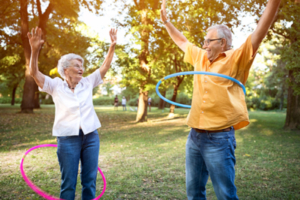The Ins and Outs of Senior Exercise
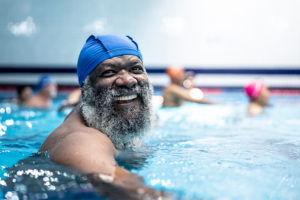
These exercise tips are a great place to start to introduce more physical activity into the life of an older loved one.
The countdown is on to the new year, and this means only one thing: deciding on a resolution you can make that you’ll actually be empowered to keep. How about setting a goal that will help both you and someone you love live healthier and feel happier? It starts with knowing effective exercise tips to achieve success.
A regular physical exercise routine is vital for all of us, but not always easy to start or maintain. One smart way to keep motivated is to identify an accountability partner and encourage each other. If you’re providing care for an older loved one, you have the perfect opportunity to help each other become more physically fit! But it is important to first know how much and what forms of exercise are best for seniors.
What’s the Ideal Amount of Exercise for Older Adults?
This varies from one person to another, and should always begin with a visit to the physician for a complete check-up and recommendations. Whatever an individual’s ability level, appropriate exercise is important. It improves bone density, muscle mass, heart and lung functioning, and much more, including boosting mood and emotional wellbeing.
There are a few general guidelines for exercise for older adults, and the news could not be better: even a small amount of physical activity will make a big difference. As little as 15 – 20 minutes per week of vigorous exercise (running, swimming, playing basketball or tennis) has been shown to lower mortality rate by 16 – 40%.
What Are Some Good Exercises for Older Adults?
Some of the best aerobic exercises to consider, which can be modified when necessary based on ability level, include:
- Dancing, which helps strengthen multiple muscle groups while improving balance and mood – and, if dancing with a partner, socialization too.
- Walking, particularly in nature, to experience varied terrains and the psychological effects that come from spending time outdoors, including a boost in mood, lowered anxiety and stress, and more.
- Cycling, either on an outdoor or stationary bike: a great low impact activity that benefits the heart, lungs, and large muscles.
How to Get Started
Getting started with a new fitness program is often the hardest part. Here are a few tips to help you both achieve success:
- Begin slowly and set attainable goals. Then celebrate reaching them!
- Select activities that are fun. With so many options, there is no reason to settle for a tedious, boring routine.
- Be sure to stay hydrated.
- Include warm-up and cool-down periods.
- If any pain or discomfort is experienced, stop.
Let Us Help!
A caregiver from Responsive Home Care makes an excellent exercise buddy to help older adults remain on track with a brand new or existing physical fitness routine. We are here to provide accompaniment to the gym, pool, senior center, or wherever else the person would like to go. We also make great walking partners! Contact us at (954) 486-6440 to find out more about our senior care services in Fort Lauderdale, Lighthouse Point, Hollywood, and the surrounding areas.

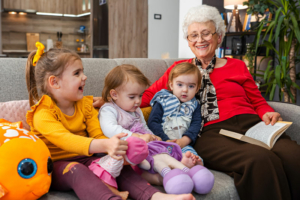
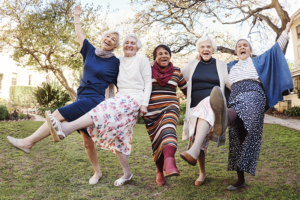
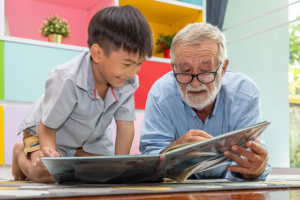 What motivates you to get up out of bed every morning? The answer is different for every single one of us, of course, but there is one commonality: it could allow you to live longer. Scientific studies are answering the question, “Does having a sense of purpose help us to live longer?” with a resounding “Yes!” as evidenced in Japan, the country with the highest life expectancy on earth.
What motivates you to get up out of bed every morning? The answer is different for every single one of us, of course, but there is one commonality: it could allow you to live longer. Scientific studies are answering the question, “Does having a sense of purpose help us to live longer?” with a resounding “Yes!” as evidenced in Japan, the country with the highest life expectancy on earth.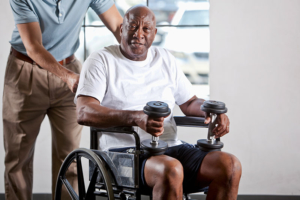 As we’re finally easing our way out of this pandemic, we’re finding more about how it has harmed senior loved ones – both physically and emotionally. We know older adults have been at a higher threat of serious issues and death due to the COVID-19 virus, although the impact of 15 months of social isolation and physical distancing is similarly distressing.
As we’re finally easing our way out of this pandemic, we’re finding more about how it has harmed senior loved ones – both physically and emotionally. We know older adults have been at a higher threat of serious issues and death due to the COVID-19 virus, although the impact of 15 months of social isolation and physical distancing is similarly distressing.